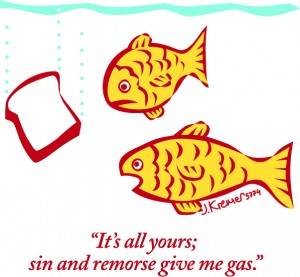“They hate us,” “they want to hurt us” are two often heard refrains in the Jewish community. Sadly this view of “the other” has had basis in truth. Our history has too many incidents of another seeking our persecution or our annihilation. From this comes a certain wariness of the other. Xenophobia has roots and fertile soil. But when we view others through this lens, we too can become the very perpetrators of the animosity we find repugnant and threatening in the other. Instead of searching for ways to coexist, we look for ways to protect ourselves from them. We isolate them hoping to insulate us. But instead, we isolate us and foreclose the possibility of building a bridge that might somehow connect us.
So during this time of Elul, the month of introspection leading up to the sacred Yamim Noraim, the High Holidays, let us take the time to look in the mirror at ourselves. Let us dare to look our own faces in the mirror and see what really is staring back. The opportunity for peace can exist only if we are first willing to take the risk of learning the truth in ourselves. Then we can see the truth in the other. And only then is there a prospect to build together.
On the international stage, we have witnessed in the ongoing Gaza conflict the perpetuating cycle of hatred. It is very difficult indeed to sit and have a coffee with someone who is dedicated to your eradication. And certainly there those who are so dedicated. But has such hatred created in us the belief that everyone on the other side is dedicated to our destruction? What happens when we begin to speak in sweeping terms that everyone is the implacable enemy? Arab devolves into an epithet used to describe the enemy, the modern-day Amelek of our Torah, the embodiment of evil. We lose sight that there are many on the other side also seeking to live their lives peacefully and with hope for a brighter tomorrow for their children. We lose the ability to reach out and seek a peace for all.
The children can teach us so very much. Hand-in-Hand schools, Seeds of Peace, Project Harmony-Israel and The Galilee Circus show us how Jew and Non-Jew can live together peacefully sharing and building. We also see Arab children taught the canards of Anti-Semitism in the public schools of Gaza and other Arab Countries. And sadly, we see the Jewish Israeli children taught the canards of animus and distrust of Arab neighbors, viewing them as second class citizens without legitimate voice or aspiration. Hatred is often taught and hatred is a learned response to the world around us. But there is another perspective. Elul is the time for us to look in the mirror and see ourselves.
Closer to home, these words of introspection apply to our daily lives as well. So often we find ourselves at odds with family or friends, cross words lead to harsh actions and harsher words and crosser actions in response. We can be estranged from the very ones with whom we should be closest because of what they said or what they did or what we perceived. But their actions might be a response to what we have said or done. Pride keeps us apart and the passing time only builds the walls separating us higher and wider. Might a close look in the mirror reveal something about our true selves that could be the bridge toward understanding? What could we have said that precipitated their reaction? And even more importantly, is the lost relationship worth the stand on principles or protected ego?
Things do not change by themselves or even quickly. We can only hope that both sides will put aside the vitriol to seek another way. If even if they cannot, we still can. We can control our actions. We can understand that protracted animosity only perpetuates the status quo, a status quo that leaves us living in anger or fear of brother or neighbor, fear of each moment, paralyzed and unable to more forward. For our brethren in Israel, the status quo requires the periodic sacrifice of their children in defense of their home; And for us, that we are alienated from others when it is precisely their relationship that we need. Maybe there is a better way. Maybe there is a brighter tomorrow for our children and us. And maybe we can be the ones to begin that process of change so that we all might someday live in peace.
Elul is the time to look in the mirror and see our stark reality and also to realize that today can be the new beginning if we are willing.

